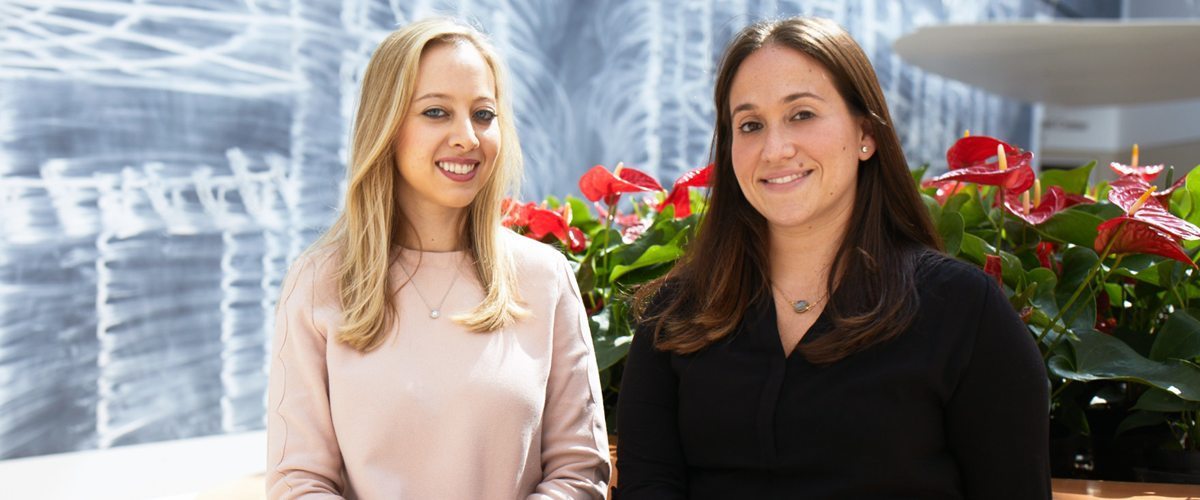Standing Up to Sexual Assault
How NewYork-Presbyterian’s Victim Intervention Program helped a young woman become strong enough to seek justice against her rapist.

Amy-Lee Goodman and the Victim Intervention Program’s Julia Hochstadt
The night of June 25, 2015, started as a celebration, with four friends going out for karaoke in New York City to mark Amy-Lee Goodman’s last day of work at a public policy firm and beginning law school.
The night ended as “a nightmare,” with Amy, then 27, hurtling toward NewYork-Presbyterian/Weill Cornell Medical Center in an ambulance.
“I only started to cry right before I stepped into the ambulance,” Amy recalls. “It didn’t seem real until then.”
But what had happened was real. Her roommate’s boyfriend of a month, Szymon (pronounced Simon) Chodakowski, joined his girlfriend and Amy that evening at the bar. He went home with them afterward, entered Amy’s bedroom later that night when she was asleep, and raped her.
“I woke up, he was inside of me, and I froze,” recalls Amy, who is just over 5 feet tall. “Szymon was 6-foot-6 — there was no way I could fight him. I said ‘no’ but he kept saying, ‘You are so sexy.’”
So, she told him she was about to be sick. He let her up, and she ran and hid in the bathroom until he left her room.
At first, Amy recalls, she couldn’t process what had happened. “I just kept thinking, ‘This can’t be real. This must be a nightmare.’”
Eventually, she called her roommate into the room and told her what happened. “Together, we called her dad, who called the police,” says Amy. Soon after, her attacker was led away in handcuffs.
A Safe Haven
By 4:30 a.m., Amy was in the care of NewYork-Presbyterian’s Victim Intervention Program (VIP). VIP’s team of three social workers and 40 volunteer advocates, the latter of whom are on call on weekends and after hours, offer free crisis intervention and assessment services in the emergency department and throughout the hospital, as well as short-term counseling.
“We’re there to offer support in whatever way we can,” says Julia Hochstadt, a licensed clinical social worker who coordinates the program and who met with Amy that first morning in the hospital.
“We help patients apply for possible financial compensation, deal with police and the district attorney’s office, and anything else they might need,” says Hochstadt. “If we can’t help, we’ll find someone who can.”
While those early morning hours at the hospital are hazy in Amy’s mind, she remembers the treatment she received at the hospital that day.
“I felt disgusting after what had happened, but Julia and the hospital staff didn’t treat me any differently, or question my story,” she says. “I was terrified to be alone, so Julia stayed with me the whole time.”
That included sitting with Amy during the rape kit examination — the process of collecting and preserving evidence of sexual assault — and later, staying by her side when two male detectives arrived to talk to Amy.
“When a victim comes in, we may be their first stop along the way. How we talk to them, how we treat them, can put someone on a trajectory toward their healing and their future,” says Hochstadt.
That includes access to doctors and nurses trained as sexual assault forensic examiners, SAFE for short, who gently walk victims through the intimate procedure.
“The last thing I wanted was anyone touching me,” says Amy. “But the SAFE nurse was incredibly sweet when she did her exam, explaining everything, asking my permission, never rushing me.”
By making me feel heard, believed, and safe throughout the next 12 hours, they laid the foundation for me to pursue justice.
Amy-Lee Goodman
Hochstadt and her team also put Amy in touch with her mother and father, arranged for Amy to contact her workplace and, perhaps most important, simply listened as Amy talked and cried.
“I felt like I didn’t know my place in the world anymore,” Amy says. Yet even in the midst of the extreme trauma, little things made a difference to Amy. “They took me to a private room, with a guard outside, so no one could barge in unexpectedly.” Amy also remembers the very first doctor who talked with her. “She mentioned that she’d gone to Wellesley College, my alma mater. Especially at the beginning, that felt comforting. By making me feel heard, believed, and safe throughout the next 12 hours, they laid the foundation for me to pursue justice.”
Single-Mindedly Seeking Justice
Maybe it was the emerging lawyer in her, but Amy, now a law student at Boston College, was determined to see her rapist convicted, something that occurs in only seven of every 1,000 rape cases in the U.S., according to the Rape, Abuse and Incest National Network.
“She was even talking about it that first night in the emergency department — she had a clear sense of what she wanted,” Hochstadt recalls. “She was a force in the months after, working with me and the district attorney’s office.”
During the next 12 months, however, Amy felt anything but forceful, her characteristic confidence and gregarious nature vanished.
“Initially, I couldn’t eat. I didn’t sleep,” she says. “I felt so vulnerable that I couldn’t let my guard down. I was too terrified to close my eyes.” She slept at a friend’s apartment, but even that brought scant relief. “I didn’t want to go anywhere alone. I was afraid that I’d run into Szymon in the city.”
Her world became much smaller, Amy says. Despite wanting to be an attorney since age 10, she decided to defer law school for a year and went to Florida to stay with her mom. “It was a dark period and I was having a hard time coping.”
Her counseling sessions with Hochstadt, however, were a haven.
“The first six months were brutal, but Julia helped me come to terms with a lot of my feelings — that I was now damaged, or that I was a failure for putting off law school,” Amy says. “My family was skeptical of my decision, but Julia said that I had to be the one to make the choice. That was empowering.”
Hochstadt also helped Amy stay strong in the face of the impending trial.
“At one point, the district attorney wasn’t sure if we should prosecute him for a felony, but holding Syzmon accountable for the crime he committed was the way I saw to push through it all,” she says. “I asked the DA, ‘What about my life?’”
Hochstadt also encouraged Amy to break out of her isolation and shame, and to tell close friends what had happened so she could get their support.

Amy-Lee Goodman
“I was too ashamed to tell anyone,” Amy says. “Julia encouraged me to widen my circle, and that was really helpful because I developed a wonderful support system of girlfriends.”
When Amy left for Florida, she continued her phone sessions with Hochstadt.
“Szymon wasn’t settling, so there was the prospect of the trial hanging over me,” she says. “Julia and my friends were there for me.”
The trial began Nov. 2, 2016, ending a week later in a guilty verdict for Chodakowski. That was a turning point for Amy.
“Being believed truly helped the healing begin,” she says.
But healing doesn’t always happen in a straight line. It occurs in fits and starts, with occasional setbacks and, sometimes, the realization that life may never be quite the same again.
“I’d never been a person who was scared of anyone or doubted myself,” says Amy. “Now I’ve left that girl behind. What 29-year-old sleeps with a nightlight? But Julia helped me realize that it also takes strength to admit when you’re not OK, to ask for help getting back on your feet. Having Julia, having my family, all moved me forward so I could create a new version of myself.”
Amy chose not just to go to trial but also to speak out at Chodakowski’s sentencing — a step she took both for herself and, she says, for other women victimized by sexual assault.
“As a victim, it’s easy to feel like you don’t have a voice,” says Amy. “At trial, I wasn’t allowed to talk about how the rape affected my life.” [Legally, only the facts of the case are allowed.] But I wanted Szymon to know how he had changed me — to have my voice heard.”
Hochstadt helped Amy prep for what is known as her impact statement, to be read aloud at sentencing. And when she heard Amy’s clear, unwavering voice in the courtroom, Hochstadt had tears in her eyes.
“Amy exemplified strength at that moment,” she says. “It was incredible that Szymon was held accountable for what he did, that she was so poised and articulate. It was one of the proudest moments of my career.”
For Amy, who is finishing up her first year of law school, it also felt gratifying to get feedback from other women, many of whom learned about her impact statement when a media outlet posted Amy’s story on Facebook.
“I got messages from my law school classmates, and a message from a high school girl who said I’d taught her that she should never let a guy treat her that way,” she says.
Just as important for an aspiring lawyer, Amy says she believes she sent a message that justice is possible for any woman who suffers a sexual assault, as well as for criminals like Chodakowski, a registered sex offender who is now serving a five-year sentence, two five-year felony counts served concurrently, plus five years’ probation.
“It should not have to be brave to report a rape,” says Amy. “It should just be the normal thing to do. People need to know that justice can happen if that’s what you choose, that there are good people who will treat you well and believe you. I was incredibly lucky to meet many of those people along the way.”
